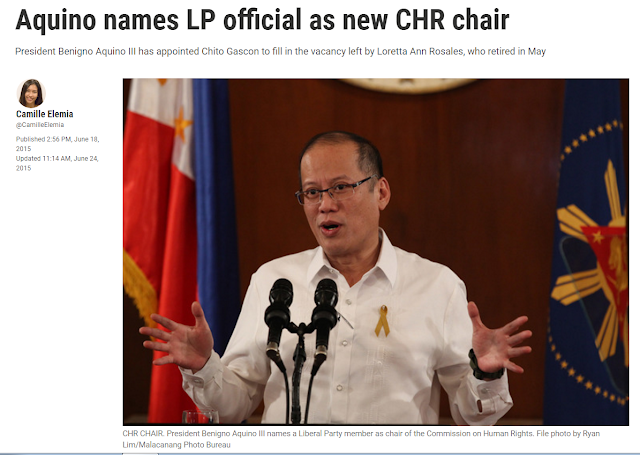"Democracy Can Not Survive Too Much Ignorance"
Former United States Supreme Court Justice David Souter once said in an interview, "What I worry about is…that an ignorant people can never remain a free people. Democracy cannot survive too much ignorance…. You can’t keep [a republic] in ignorance." More pressing than failing scores in standardized exams, declining government institutions and civic ignorance are truly troubling signs of a severely lacking basic educational system. One might point to the current state of politics in the US as an example, but a much more glaring illustration is the Philippines. In 2015, Aquino appointed Jose Luis Martin C. Gascon as the new chairperson of the Commission on Human Rights (CHR). Gascon was the vice president for Social Movements of the Aquino-led Liberal Party (LP) and a former LP director-general. CHR is supposed to be an independent body tasked to protect Filipinos' political and civil rights, both in and out of the country. It is perhaps due to either ignorance or arrogance that Aquino failed to see the grave importance of nonpartisanship in an independent body like the Commission on Human Rights.
And it is not just Aquino. News Media like Rappler did not even comment on such glaring error. The job of the CHR is daunting especially in the Philippines where due process is greatly wanting, paramilitary forces are present, and relationships between criminals and officials abound. Only a few months after Gascon's appointment, the head of a school that served indigenous people was assassinated.
This case remains unsolved and after two years, all that Gascon can do is to apologize to the Lumad people.
The bitter fruit of partisanship in CHR has also become evident when the current president, Duterte, not a member of Aquino's Liberal Party, took a strong stance against the CHR in his second state of the nation address. Duterte, in an interview, points out that CHR should likewise investigate alleged atrocities made by rebels to which Jodesz Gavilan of Rappler remarks, "Duterte’s request goes against the primary mandate of CHR. According to the 1987 Constitution, CHR is expected to investigate alleged human rights violations perpetrated by state actors or the government." Whether this is a correct interpretation of the Constitution is actually unclear especially when the Constitution specifically states that the CHR should "Provide appropriate legal measures for the protection of human rights of all persons within the Philippines, as well as Filipinos residing abroad". Surely, if rights of Filipino overseas workers are included, CHR's responsibility is not limited to Philippine state actors.
 |
| Above copied from Rappler |
And it is not just Aquino. News Media like Rappler did not even comment on such glaring error. The job of the CHR is daunting especially in the Philippines where due process is greatly wanting, paramilitary forces are present, and relationships between criminals and officials abound. Only a few months after Gascon's appointment, the head of a school that served indigenous people was assassinated.
 |
| Above copied from Bulatlat |
This case remains unsolved and after two years, all that Gascon can do is to apologize to the Lumad people.
 |
| Above copied from Bulatlat |
The bitter fruit of partisanship in CHR has also become evident when the current president, Duterte, not a member of Aquino's Liberal Party, took a strong stance against the CHR in his second state of the nation address. Duterte, in an interview, points out that CHR should likewise investigate alleged atrocities made by rebels to which Jodesz Gavilan of Rappler remarks, "Duterte’s request goes against the primary mandate of CHR. According to the 1987 Constitution, CHR is expected to investigate alleged human rights violations perpetrated by state actors or the government." Whether this is a correct interpretation of the Constitution is actually unclear especially when the Constitution specifically states that the CHR should "Provide appropriate legal measures for the protection of human rights of all persons within the Philippines, as well as Filipinos residing abroad". Surely, if rights of Filipino overseas workers are included, CHR's responsibility is not limited to Philippine state actors.
The crisis involving CHR has reached the highest level as the House of Representatives voted to allot only $20 for the body's annual budget. The public's reaction to this move, of course, has also been shaped by partisanship. Duterte's supporters see it as a long-awaited rectification of CHR's partisanship. Duterte's opponents see it in an exactly different light.
 |
| Above copied from Shame on you! Twitter rages vs House vote on CHR budget cut |
Again, there is ignorance. Respect for human rights should not be equated to the existence of a Commission on Human Rights. In fact, there is actually no need for such a commission if human rights are already protected in a country. And with the Philippine constitution, human rights are supposed to be protected whether there is a commisssion or not.
The current problems the Philippine government and its people are facing can be traced to poor education. Souter's words ring loud and clear across the archipelago, "Democracy can not survive too much ignorance".
Comments
Post a Comment